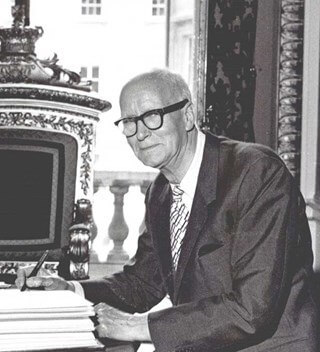Christopher Hinton was one of the 20th century’s most eminent engineers, making an enormous contribution both to energy generation technology and later to politics as an active member of the House of Lords.
At the UK Atomic Energy Authority, he oversaw the design and construction of the uranium extraction factory at Springfields; the Windscale facility with its production piles and complex chemical plants; the diffusion plants at Capenhurst; the first nuclear reactor at Calder Hall; and the fast breeder reactor at Dounreay. He continued to contribute to public service during his retirement, as a special adviser to the World Bank and as Chair of the International Executive Committee of the World Energy Conference from 1962 to 1968.
Lord Hinton was a highly successful first Chancellor of the University of Bath. He received many national and international awards for his achievements during a long and distinguished career. He was elected a Fellow of the Royal Society in 1954.
As President of the Council of Engineering Institutions, Lord Hinton was involved in the final stages of creating the Fellowship of Engineering, now the Royal Academy of Engineering. He brought enthusiasm and energy to his presidency of the Fellowship and was instrumental in developing its activities and administration. He introduced an annual Distinction Lecture in 1977, which was renamed the Hinton Lecture when he retired as President and is still the Academy’s premier annual lecture.

Lord Hinton
- 1901 Born 12 May in Tisbury, Wiltshire
- 1917 Begins engineering apprenticeship with Great Western Railway at Swindon
- 1926 Graduates with a first-class degree in mechanical sciences from the University of Cambridge
- 1926 Starts work with Brunner Mond (forerunner of ICI)
- 1940 Seconded to the Ministry of Supply
- 1946 Becomes Deputy Controller of Production, Atomic Energy
- 1951 Knighted for services to industry
- 1954 Appointed Member for Engineering and Production, UK Atomic Energy Authority
- 1957 Becomes first Chair of the new Central Electricity Generating Board
- 1965 Receives life peerage as Baron Hinton of Bankside
- 1966 Appointed first Chancellor of the University of Bath
- 1976 Appointed President of both the Council of Engineering Institutions and the newly formed Fellowship of Engineering
- 1976 Appointed to the Order of Merit
- 1983 Dies 22 June, aged 82
